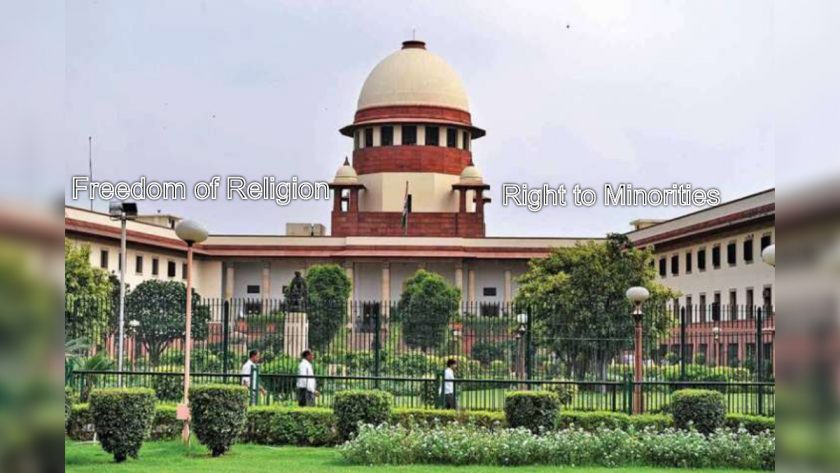Candidates for Reservation Categories that make it on their own achievements must be adjusted to the general category: Sc
The Supreme Court has reaffirmed that the candidate for the reservation category, which scores more than the cut-off value for the general category candidate, must be adjusted to the general category based on their categories and not reserved.

Own achievements must be adjusted to the general category candidates
“The principle that the candidate for reservation categories which makes it their own achievements must be adjusted to the general category candidates have not been doubtful”, the court observed in the case of the state of Tamil Nadu and others V K Shobhana, etc., Referring to some precedents.
Three Bench Judges consisting of Judge Sanjay Kishan Kaul, Dinesh Maheshwari, and Hrishikesh Roy are considering the appeal submitted by the Tamil Nadu state on the assessment of Madras High Court.
Tamil government services (service conditions) ACT, 2016
Problems, in this case, are related to the sequence of filling vacancies as per part 27 (f) of Nadu Tamil government services (service conditions) ACT, 2016. The problem arises from the recruitment process directly to the post of postgraduate assistant and director of physical education, class-I.

Backlog vacancies under the most back class category (MBC) and Denotification Community (DNC)
Respondents, in this case, show that some candidates, which will be selected and even without reservations, appointed in the quota for backlog vacancies under the most back class category (MBC) and Denotification Community (DNC). They argue that such a contributing candidate must be appointed under the general category, leaving backlog vacancies to be filled by candidates for other reserved categories.
The state of Tamil Nadu places dependence on Section 27 (F), which deals with filling vacancies from reservations that are not filled in next year and filling mode of backlog vacancies in the next recruitment.
The last sentence from section 27 (f) is read as:
The choice for the next directive recruitment must be done first for the “Backlog” job and then normal rotation must be followed:
Emphasizing the word “first” in the provisions above, the state of Tamil Nadu and several other candidates argue that part 27 (f) mandates that on the basis of merit, vacancies are first fulfilled. After the job is filled, the appointment must be made based on the points in general service.
Correct Methodology
On the other hand, respondents argue that the correct methodology is the first, the list must be arranged based on merit, and then only the problem of implementing reservations will appear. So, first of all, candidates who were selected by merit will take their place in a public service list where no reservation will apply. The order will apply afterward, where backlog vacancies will be filled in advance, followed by the current year vacancies. In short, the argument is that part 27 of the action has nothing to do with selection based on achievement, and only applies to the reservation mode.

Approved with the respondent’s argument, the Supreme Court observed:
“In our view, section 27 (f) of actions cannot be read by away, regardless of other reasons, to negate this principle. Part 27 deals with reservations. This has nothing to do with the list of general candidates. Like the candidate has made it with their own merit to services though, from the categories ordered, did not seek the benefits of the reservation. Thus, part 27 of the action will not have anything to do with it. Part 27 will apply only when the reservation principle starts, which after filling the seat on merit alone “
Public / Open category vacancies
The judgment also refers to the recent Process of SC in the case of Saurav Yadav V of the state of Uttar Pradesh which believes that candidates belong to the reserved, eligible to fill the public / open category vacancies are also based on score.
Regarding the application of Part 27, the court explained:
“Part 27 will only apply when the principle of reservation begins, which after filling the seat on merit. Thus, the word” first “will apply at that stage, that is, backlog vacancies must be filled in advance and currently the job is to be filled after. At the time General category chairs are being filled, thus there are no questions about carrying forward or current vacancies for the category required at all “

Social philosophy of vacancies
Judgment given by Justice Kaul observed that the section propagated the social philosophy of vacancies for the reserved were not disturbed if there was a number of inadequate candidates. Thus, instead of offering it to the general category, the provisions have been made to advance the vacancies for one year.
Referring to Saurav Yadav’s decision, the judge explained the steps for the appointment process as follows:
(A) The general merit list must be filled first;
(B) Backlog vacancies from the category specifically ordered to be then filled in “first”; and
(C) The remaining reserved vacancies for the current year to be filled afterward.
Case Details
Title: Tamil Nadu and other V K Shobhana etc.
Bench: Judge S Kaul, Dinesh Maheshwari & Hrishikesh Roy
Appearance: senior advocate C a Sundaram, Nagamuthu for the appellant; Senior advocates and tatters for respondents.

